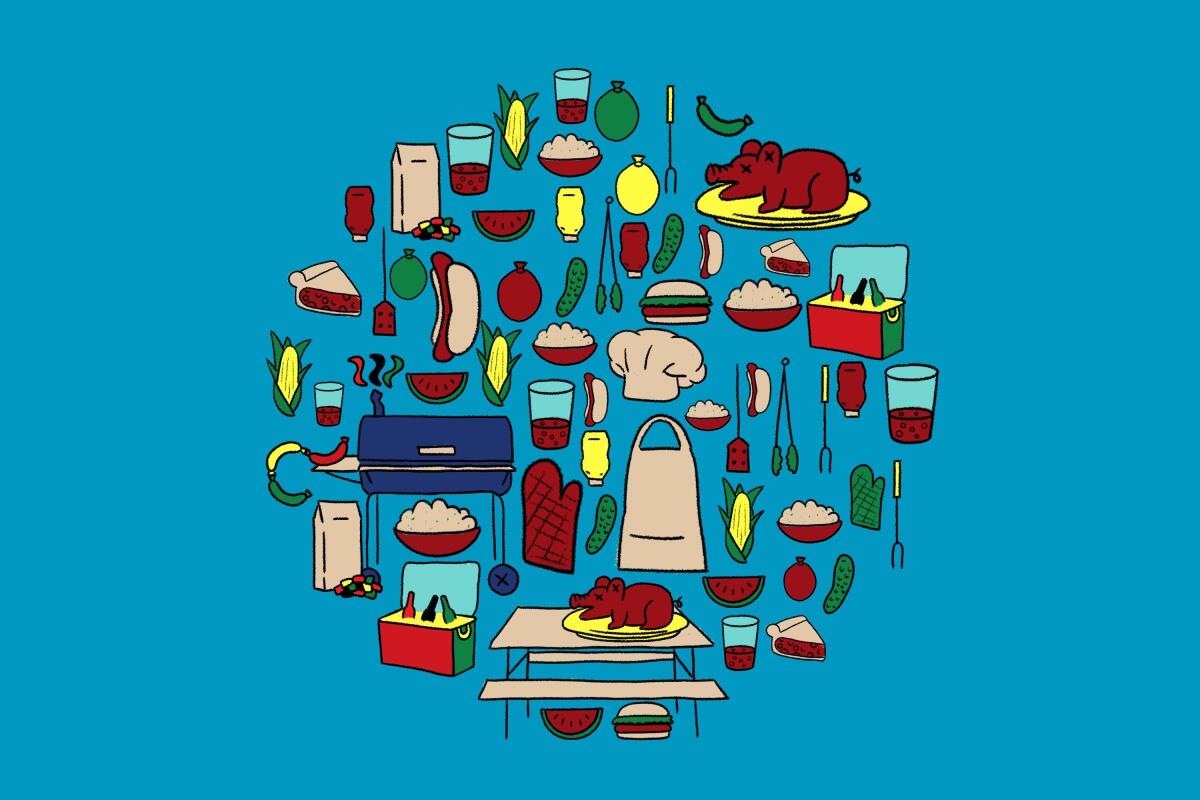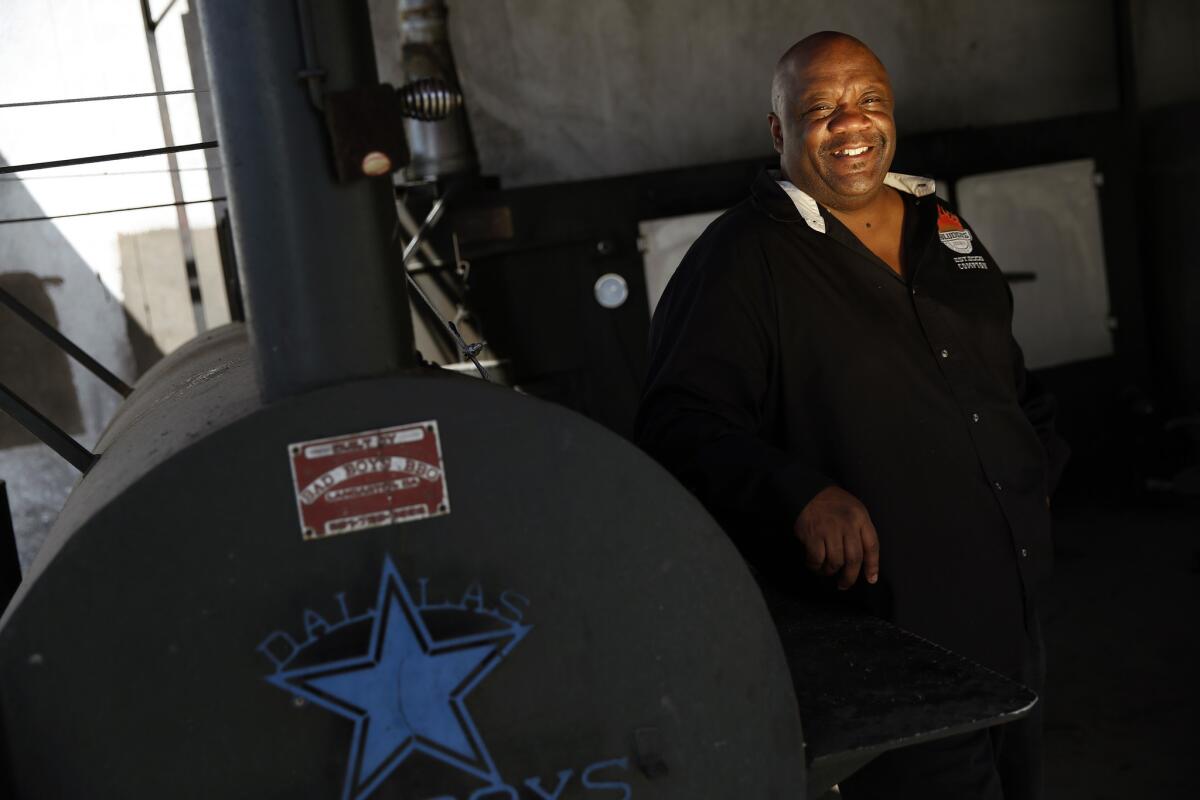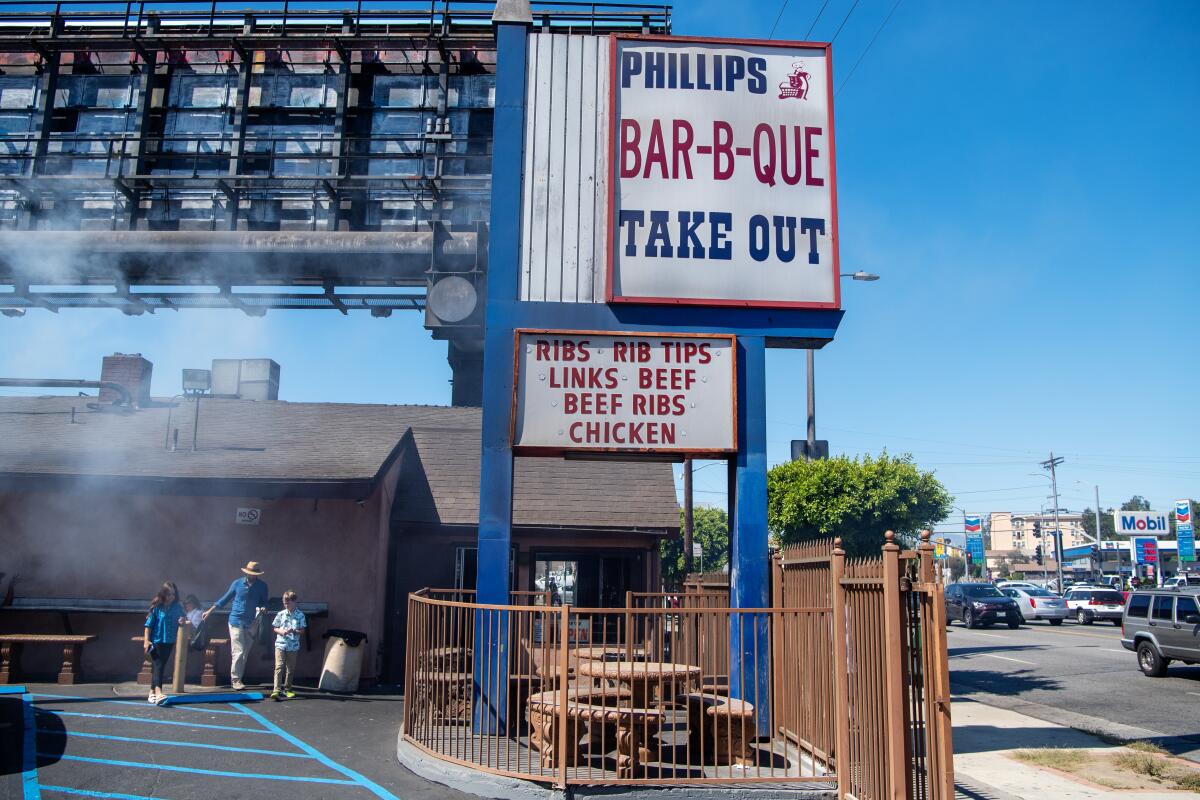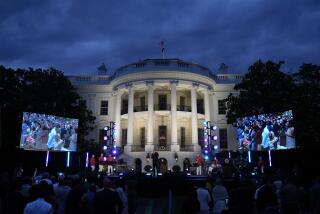How a Texan showed L.A. the way to celebrate Juneteenth

- Share via
“Why is everyone going to work? Why are the banks open?’” Jonathan Leonard recalled in a 1997 Times interview about the first June 19, or “Juneteenth,” he spent in Los Angeles after moving from Houston in 1948.
Throughout the South and in Texas, the holiday — which commemorates June 19, 1865, the day Union Army Maj. Gen. Gordon Granger announced in Galveston, Texas, that the enslaved people were free, more than two years after the Emancipation Proclamation went into effect on Jan. 1, 1863 — was heavily celebrated. Juneteenth celebrations are communal gatherings marked by such traditions as prayer, reading the Emancipation Proclamation aloud, speeches, parades, brass bands, singing and athletic competitions, especially baseball.
In the Los Angeles area, African Americans have long celebrated slavery’s end, but those celebrations haven’t always been tied to Juneteenth.
In the late 1890s, African Americans in Pasadena marked the anniversary of the Emancipation Proclamation on Jan. 1. By 1910, Angelenos were celebrating emancipation on June 19, but media accounts of those celebrations make no mention of the word “Juneteenth.” By the 1930s, annual Juneteenth picnics were a regular feature of African American life in Los Angeles, but the celebrations were on a small scale — so much so that Texas migrants who settled in L.A. went back to Juneteenth’s home state to celebrate. They looked forward to every aspect of the celebration, especially the food, which typically includes barbecue, watermelon, red drinks, side dishes and desserts.
To invigorate Juneteenth in L.A., Leonard, a military veteran, longtime postal employee, firefighter and entrepreneur, started hosting barbecues in his backyard on June 19, 1949. He soon transitioned to organizing larger, public gatherings.
As host, Leonard provided the barbecue, red drink, watermelon and entertainment at the annual event in Leimert Park. For years, his name was synonymous with the popular Juneteenth celebration, but it didn’t really pick up steam until the late 1990s. Soon, additional celebrations were popping up in other parts of Los Angeles as well as in Colonel Allensworth State Historic Park north of Bakersfield, which preserves Allensworth, a town that was founded, financed and governed by African Americans.
Although Juneteenth is considered a Texas holiday, it has spread across the country, often supplanting long-standing emancipation celebrations tied to a different date, and it is taking on even greater significance this year amid nationwide protests after the police killing of George Floyd in Minneapolis.
Communities outside Texas usually owe their Juneteenth traditions to a passionate Texan who arrived and kick-started the festivities. For Los Angeles, that Texas native was Leonard. He died in 2017, but others in the city are keeping the tradition alive and vital.
“I grew up in Compton, but I looked forward to going home to visit my grandmother in Texas during Juneteenth. We always had barbecue, red soda and watermelon to eat,” remembers Kevin Bludso, owner of Bludso’s Bar & Que on La Brea Avenue. Those foods form the “Juneteenth trinity” recognized wherever an authentic Juneteenth celebration takes place.
“There was also a special place reserved for elders whose parents were slaves. We honored them, and it reminded us that we weren’t that far in time from slavery,” Bludso says. Time was set aside for them to share their experiences, or their parents’ experiences, with slavery. They concluded with emphasizing how happy they were to now be free.

The type of barbecue served on Juneteenth is usually chicken, chopped pork, pork spareribs and hot links, a spicy, coarsely ground, encased sausage of pork, beef or a mix. Some cooks might add brisket, goat, opossum with sweet potatoes or cook an entire pig for the occasion. Of the latter, Bludso recalls, “I remember them digging a hole in the ground and cooking a whole pig that way.”
Cooking a whole animal over a trench filled with hot coals was a reverential nod to the way enslaved people barbecued for more than two centuries. Still, Juneteenth barbecues have been updated for modern times. “At some point, they started barbecuing in a cinder block pit,” Bludso says, and that has given way to grills and smokers today.
Cooks get a fair amount of leeway with side dishes. But a spectacular potato salad is a must. This dish is so important that it’s often assigned to someone who has an established reputation for making it. Woe to the cook who falls short!
The obligatory beverage is “red soda,” or “red soda water” as it was first called in the late 1880s. These belong to a broader family of nonalcoholic beverages that are generically called “red drink.” Red drink can be anything: a carbonated beverage, flavored tea or punch that has a cherry, cranberry, raspberry, strawberry or tropical punch flavor. It just has to be red. Some argue that it is soul food’s official drink. The Juneteenth red drink of choice is Big Red Soda, manufactured in Waco, Texas. (For those seeking tasting notes on this particular carbonated beverage, Big Red has the crisp structure of red berries with undertones of cotton candy.)
In African American circles, “red” is a color and a flavor. A ripe watermelon with juicy, red flesh is the traditional Juneteenth dessert, but in recent decades, red-appropriate desserts such as a red velvet or strawberry cake have been added to the menu.
Why must the Juneteenth menu be filled with red-colored food and drinks? It’s a matter of symbolism. The red represents the blood shed by innumerable African Americans in the struggle for freedom. A struggle that, sadly, endures.
This year, a troubling question for L.A.’s Black community is how to celebrate in these tragic and turbulent times, as the recent killings of Floyd and so many others show how much our nation has failed to reckon with racism, and as COVID-19 deaths continue to spike, the disease disproportionately sickening African Americans.
In grief, Detroit’s Marsha Music writes tender goodbyes, praise-filled shoutouts as the coronavirus outbreak ravages black communities
“My heart is both filled with sadness and happiness,” said Moza Mjasiri Cooper, the founder and producer of an annual Juneteenth festival in Los Angeles, which has been canceled this year because of COVID-19 restrictions on mass gatherings.
“Given what has happened, more people are now recognizing the need for a Black Day of Independence. They see the injustice, and they realize what needs to be done and that freedom and equality are for everyone.”
Local African American restaurants are still marking Juneteenth with menu specials, hoping that customers will support them especially after the challenges caused by the pandemic. Bludso’s Bar & Que will offer legit Texas style-barbecue. In addition to Big Red, Bludso’s offers Cheerwine, a North Carolina favorite, and jamaica agua fresca. The latter is popular in Latinx taquerias and traces its roots to a West African drink called bissap, a tea made from the flower petals of the hibiscus plant that are steeped in water and sweetened to taste.
Phillips Bar-B-Que, a Los Angeles institution since 1980, will simultaneously celebrate Juneteenth and its 40th anniversary this weekend with a special menu. Go for the pork ribs or rib tips with “mixed” sauce, a blend of hot and not barbecue sauces.

Though Juneteenth has a party feel to it, celebration organizers traditionally take time to speak about contemporary issues. This year is no exception. Cooper says that COVID-19 restrictions have made it impossible to have the big celebrations of the past with activities and food concessionaires. Still, this Friday, there will be a morning march in Pomona from the African-American Museum of Beginnings to the Juneteenth monument in Ganesha Park and a noon rally at the Hot & Cool Cafe in Leimert Park. The community seeks answers to so many questions, and recent events have served as a sober reminder that even after 400 years in this country, African Americans have tasted freedom, but a thirst for racial justice and a hunger for equality remains.
More to Read
Eat your way across L.A.
Get our weekly Tasting Notes newsletter for reviews, news and more.
You may occasionally receive promotional content from the Los Angeles Times.










